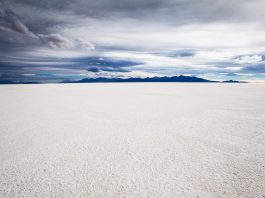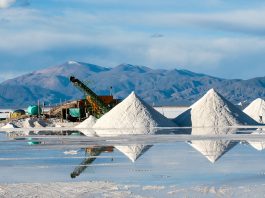Research from the Karlsruhe Institute of Technology (KIT) suggests that Germany can potentially extract thousands of tons of lithium annually using geothermal power plants – a significant boost for ensuring the country’s battery supply.
The concept of obtaining lithium as an environmentally compatible and regionally available by-product of geothermal power plants is an exciting possibility. Here, thermal water is pumped up, and lithium is separated to use in fabricating batteries for electric vehicles. However, until now, it has not been clear if domestic lithium extraction is viable.
KIT researchers have now analysed the lithium extraction technologies and raw materials markets, finding that utilising geothermal power plants could yield significant quantities of the precious resource, although certain aspects of the process need to be addressed.

Why enhancing the lithium supply is vital
For Europe to facilitate its transition to a carbon-neutral economy, countries across the continent will need to acquire sufficient amounts of lithium to suffice the increasing battery demand. Lithium is classified as a critical resource by the European Union (EU); however, there is a real risk of a lithium shortfall.
Valentin Goldberg from KIT’s Institute of Applied Geosciences (AGW) explained: ” We are entirely dependent on imports. Worldwide, 80% of lithium resources come from Chile and Australia. At the same time, we deliberately accept major environmental expenses due to the conventional extraction of lithium in these countries, including negative impacts on groundwater.”
Alternatively, lithium extraction in geothermal power plants is planned using existing infrastructure, in which volumes of thermal water with a sometimes high lithium concentration are extracted. After energy production, the lithium will be separated, and the remaining water will be resupplied into the ground.
Goldberg said: “In principle, we are very positive about this technology. Hardly any space would be needed, and environmental and transportation costs would be low.”
The potential of geothermal energy plants for lithium extraction is clear, but until now, applying it in the real world has not been fully explored.
Benefits of using geothermal power plants for extracting lithium
The volume of extraction depends not only on the water’s lithium concentration but also on the location-dependent flow rate and reservoir dimension. To estimate lithium potential, the team analysed raw material markets, potential locations in Germany, and assessed efficiencies of various technologies, applicability, and integration in geothermal power production.
Dr Fabian Nitschke, AGW, who was also involved in the studies, commented: “On this basis, we have obtained an optimistic annual production estimate of about 2,600 to 4,700 tons lithium carbonate equivalent, provided that all relevant geothermal energy plants are equipped with the necessary systems. With this, we could cover about 2-13% of the annual quantity needed for planned battery production in Germany.
“Construction of additional geothermal power plants might increase the extraction volumes. However, it will take at least five years for a newly planned power plant to start operation. In view of the predicted global lithium shortfall and planned battery production, the situation in Germany will deteriorate soon. For this reason, lithium from geothermal power plants will do nothing but complement imported resources in the medium term.”
There remain many uncertainties about utilising geothermal power plants for lithium extraction, such as the dimensions and the origins of lithium resources in geothermal systems and the response of the reservoirs. Furthermore, extraction technologies are not advanced enough currently.
Dr Tobias Kluge, AGW, another author of the study, explained: “Direct comparison already reveals specific advantages and drawbacks that are of particular relevance to economically efficient lithium extraction. The need for additional resources, damage caused by deposits in boreholes and extraction units, and energy consumption directly affect economic efficiency.”
The researchers explained that it would not be technology development or suitable locations that would decide how lithium is extracted in Germany but public support and acceptance.
Goldberg concluded: “Our publications do not only address experts. We rather want to give decision-makers in politics and industry as well as the interested public a chance to inform themselves directly and independently about opportunities and challenges.”









